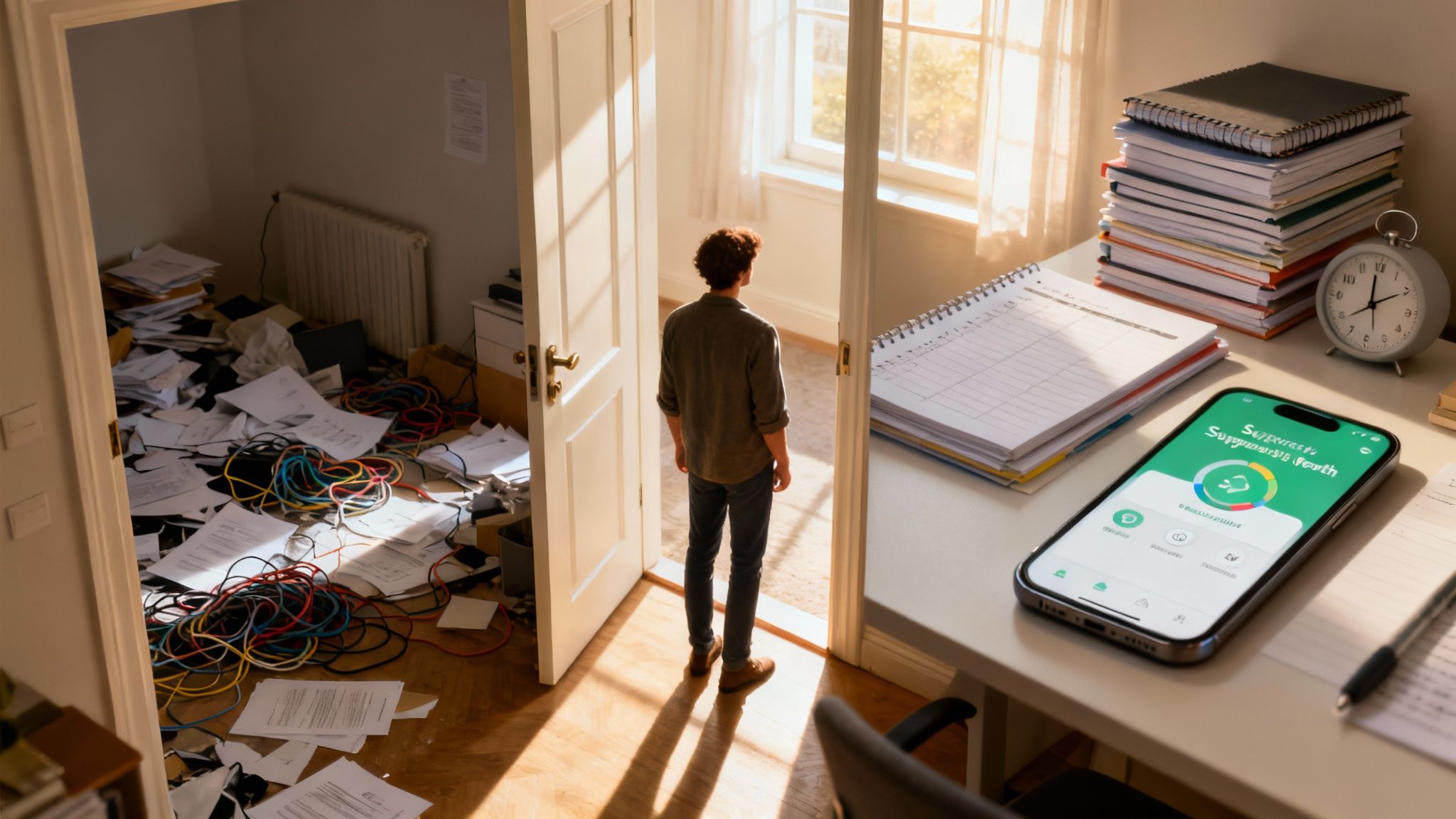For most people with ADHD, small talk is something to endure, not enjoy. It can feel tedious, awkward, or downright painful.
But making polite conversation is often necessary, so it's a good idea to learn how to improve. Read on to discover why small talk is so hard for ADHDers and our best tips to improve it.
Too long; didn't read
- Small talk can feel uncomfortable for many people with ADHD due to difficulties with attention, impulsivity, and slower speech processing.
- Social anxiety is a common comorbidity amongst ADHDers.
- You can improve your small talk skills by preparing beforehand, being mindful of body language, and talking about things that interest you.
Why does small talk feel unbearable for neurodivergent brains?
We don't know what to talk about.
Talking about work can be so boring. But what do we talk about if work and the weather are off the table?
Small talk can feel meaningless or like it's a waste of time for people with ADHD. Often, we want to jump right into topics that interest us, and telling you about the traffic on our way to the party isn't it.
Answering questions like "How was your week?" can feel overwhelming, and it can be difficult to think of an answer that’s interesting enough.
Small talk requires so much attention.
To engage in small talk, you need to use several forms of attention and memory:
- Selective attention: the ability to filter out irrelevant background noise and focus on one thing
- Alternating attention: the ability to switch your attention from one thing to another, such as from one speaker to a different one
- Sustained attention: focusing on something without interruption
- Working memory: the temporary storage of information (i.e., things you can keep in mind for a short period of time)
People with ADHD often have a hard time with one or all of these, so our speech processing tends to be slower in noisy settings, especially with inattentive type ADHD.1 Even though small talk seems casual, there's a lot going on. For ADHDers, it can take a lot of effort to keep up with all the banter.
We get overwhelmed easily.
Anxiety is a common comorbidity for people with ADHD. On top of that, ADHD symptoms are strongly correlated to social anxiety.2
Social gatherings can be really overwhelming and leave us feeling exhausted. So instead of making small talk, we're probably just trying to make it through the evening.
We've learned to avoid it.
The core symptoms of ADHD—inattention, hyperactivity, and impulsivity—often make conversations more difficult.
Zoning out, interrupting others, or oversharing are common challenges, so for many ADHDers, avoiding small talk is a learned behavior from childhood.
“If you’ve struggled with friendships, now or in the past, you are far from alone. Though it may seem to come naturally to others, this is not the case. Most of us have to learn and develop our social skills over time through trial and error, feedback, and self-reflection.” - The Inflow app | Social skills module, day 4
Want to be more comfortable in social settings? Learn about creating conversation arcs, overtalking, oversharing, and how to stop interrupting on the Inflow app. Get started today!
Tips and topics for surviving small talk with ADHD
Remember the basics of socializing.
- Introduce yourself.
- Ask open-ended questions, then listen to the other person's answers.
- Know how to exit a conversation gracefully: "I need to refill my drink, but it was great talking to you!"
Prepare ahead of time.
- Practice making small talk wherever you go, even if it’s just a single interaction.
- Pay attention to the questions other people ask you so that you can use them on other people later.
- Make a note on your phone with a list of topics to discuss before attending a social gathering. Bonus points if they’re relevant to the people that will be there!
- Think of answers to common questions. Being asked if I did anything fun this weekend makes my mind go blank, so having an interesting answer ready takes the stress off.
Talk about something you're watching.
"I just started watching [insert TV show] – have you seen it?"
If they say yes, follow up by asking what episode they're on, their thoughts on specific characters or actors, or if they have any predictions for the season.
And if they say no, that's an excellent opportunity to ask what they have been watching!
Lighten the mood.
I'm sure you've heard the golden rule for polite company: Never talk about sex, politics, or religion. And yet, there's always that one person who inevitably brings up an uncomfortable topic. Don't be that person. Instead, use the moment to lighten the mood and bring some humor into the conversation.
Try something like, "Alright, I've got to ask your opinion on something really controversial…" followed by a non-controversial question:
- Who do you think was the best Spiderman?
- Were Ross and Rachel on a break?
- So, tell me - does pineapple belong on pizza?
- Is a hotdog a sandwich?
You show a sense of humor by starting with a serious warning and ending with something more lighthearted. On top of that, it's a good way to spark a fun discussion that won't hurt anyone's feelings.
Try the FROG method.
Turn small talk into big talk using the FROG method. The acronym stands for family, recreation, occupation, and goals. Remember that people like talking about themselves, so asking good questions will take the pressure off you.
- Family: "Do you have kids?" "How did you meet your spouse?"
- Recreation: "What do you like to do when you're not working?" "What is your favorite art form?"
- Occupation: "What made you get into the industry?" "What's the most frustrating part of your job?" (These answers are often funny if they work with customers!)
- Goals: "What would you do with your time if you didn't have to work?" "What's your dream vacation?"
Just be honest about your anxieties.
"I've always hated small talk; I'm just no good at it" is a perfectly acceptable thing to say at a party! In fact, you'd be surprised by just how many people feel the same way.
So, if you're at a loss for words, try being honest about it. If you do it with a smile, it'll come across as endearing rather than complaining. It can even be a good conversation starter.
One of two things will happen if you're honest with them:
- The other person will agree that small talk is the worst, and you can chat about your shared experience.
- The other person will say they actually enjoy it. In that case, you can use it as a chance to compliment them and ask follow-up questions. "I'm so envious of you! Tell me, do you have any go-to tips for introverts like me?"
Final thoughts
Small talk is usually uncomfortable and awkward for everyone, but it can be excruciating for ADHDers due to our difficulties with attention, impulsivity, anxiety, and speech processing. But fear not! Fortunately, we can improve our skills to survive small talk. You can try preparing beforehand, focusing on personal interests, using humor or the FROG method, or just being honest about struggling with small talk.
So take a deep breath, embrace the challenge, and conquer the world of small talk, one awkward conversation at a time.
Sources
1 Research in Developmental Disabilities | Listen up! ADHD slows spoken-word processing in adverse listening conditions: Evidence from eye movements (2023)
2 Psychiatry Research | The relationship of social anxiety disorder symptoms with probable attention deficit hyperactivity disorder in Turkish university students; impact of negative affect and personality traits of neuroticism and extraversion (2017)








